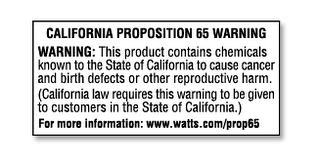
I shelfed my first research idea the other day.
Californians are used to warning signs like this one. As a libertarian, I loathed the language used in the sign. It was obvious that it helped no one. Ever since I learned the tremendous costs associated with putting up the sign, I extended the list of evils that governments can do to you. If I hate it so much, why don't I do something about it? I told myself.
As a consequence, I set out to prove Proposition 65 is useless. I started to read the literature and found it to be a daunting task. The purpose of Proposition 65 was to help consumers make the right choice when they are faced with the trade-off between health risk and price. Yet, people who drafted the proposition did not want to appear anti-business. The compromised version was then meant to be ambiguous. As it turned out, consumers are either totally scared away by the products or totally ignorant of the sign. The language is too vague to distinguish those with dire consequences from those with pretty mild effects. In a nutshell, it failed to help consumers make the wise decision it was purported to.
But the evidence is hard to come by. I thought that if I could prove nothing has happened in public health before and after the passage of the proposition, I would be able to claim it to be a waste of social resources. It was simply not workable, as I was told by Prof. Dobkin. If there is any effect of any specific chemicals, it would be long-term and complicated by other factors as well. The causal effect will be impossibe to identify. I had to turn to to study the effects on business side instead.
What do you know? Proposition 65 did do some good if we look from business' perspective. Reading archived newspaper and megazines, I identified some anecdotal evidence. Some big companies, like Gillette, did reformulate their products to avoid the Proposition 65 labels. Either out of fear of lawsuits or out of competition pressure, companies did try to eliminate the use of toxic components. Again I thought, "If I can find evidence showing that the use of certain chemicals dropped significantly after the passage of Proposition 65, I might conclude that Proposition 65 works."
You see how absurd researchers are. You set out to disapprove one thing and you ended up reinforcing the thing you were against. But the fact is, researchers must be open-minded and willing to accept any scientific evidence that is against you. It is not absurdness, but scientific spirits.
I was glad that I took this positive approach. However, I did not seem to be able to get the beautiful cliff-like curve. Companies do not react to regulation change at the snap of fingers. It takes time.
That was why I decided to shelf my first research idea.
As a concluding remark, libertarians like me still do not like such regulations. Without the proposition, firms still might reduce the use of toxic components either out of fear of lawsuits or out of competitioin pressure (see, the same market forces are working). The correct next step, ifthere is anyone desiring to pursue this avenue, will be weighting the costs and benefits of the proposition. Meantime, I will keep hating the annoying labels until Proposition 65 is proved to be economically beneficial.
No comments:
Post a Comment